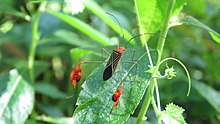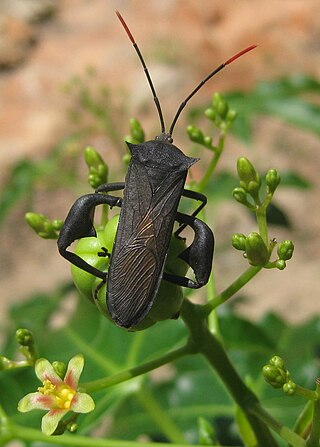
Coreidae is a large family of predominantly sap-sucking insects in the Hemipteran suborder Heteroptera. The name "Coreidae" derives from the genus Coreus, which derives from the Ancient Greek κόρις (kóris) meaning bedbug.

Leptoglossus is a genus of true bugs in the leaf-footed bug family and the tribe Anisoscelini. Species are distributed throughout the Americas, with some records in eastern & southern Asia and Europe. Several species are economic pests of agricultural crops. Like members of some other genera in the family, these bugs have leaflike dilations of the hind tibia. Several species are of economic importance, and one species, L. chilensis, has been reported to bite humans.

Anisoscelini is a tribe of leaf-footed bugs in the family Coreidae. It was formerly spelled Anisoscelidini, but the tribal name spelling was incorrectly formed.
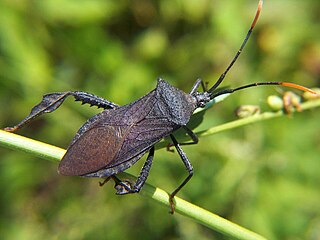
Acanthocephala is a New World genus of true bugs in the family Coreidae. The name is derived from the Greek akanth- meaning "thorn/spine" + kephale meaning "head", and combined the name would be "spine head". This name is in reference to the spine on the front of the head.
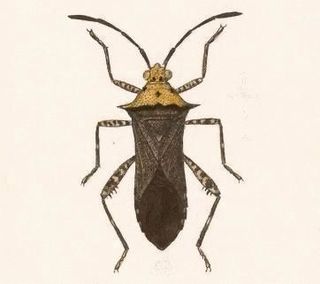
Zicca is a genus of leaf-footed bugs in the family Coreidae. There are about 19 described species in Zicca.
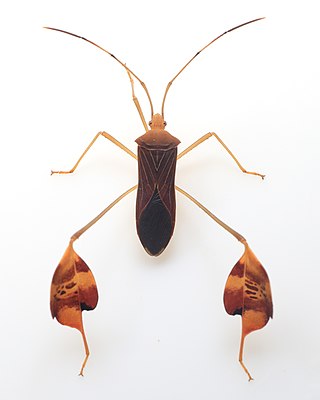
Anisoscelis affinis, the flag-footed bug, is a species of leaf-footed bug in the family Coreidae. It is found in Central America and Mexico. It was first described by English entomologist John O. Westwood in 1840 as an insect found in Mexico, with no additional location information. In Introduction to Entomology, part of The Naturalist's Library by James Duncan, the species is described as similar, but distinct from, Anisoscelis hymenipherus, and native to Mexico: "A third species, undescribed, closely allied to the latter, but smaller, with the thorax and hemelytra entirely fulvous red, and the legs entirely pale ochreous, is contained in the collection of the Jardin des Plantes, and to which the specific name of affinis may be applied."

Mozena is a genus of leaf-footed bugs in the family Coreidae. There are more than 30 described species in Mozena.

Cimolus is a genus of leaf-footed bugs in the family Coreidae. There are at least four described species in Cimolus.
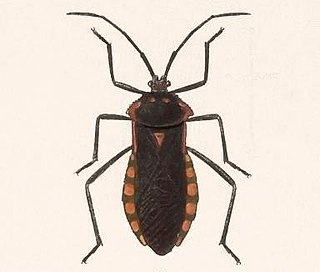
Sephina is a genus of leaf-footed bugs in the family Coreidae. There are more than 20 described species in Sephina.
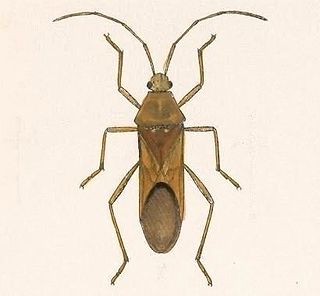
Savius is a genus of leaf-footed bugs in the family Coreidae. There are about nine described species in Savius.

Anisoscelis alipes is a species of leaf-footed bug in the family Coreidae. It has been observed in Costa Rica, Colombia, Panama, Ecuador, Venezuela., and Mexico. It was first described by French entomologist Félix Édouard Guérin-Méneville in 1833. Anisoscelis flavolineatus, previously considered a distinct species, is currently considered a synonym of A. alipes.

Anisoscelis hymenipherus is a species of leaf-footed bug in the family Coreidae. It occurs in South America. It was first described by English entomologist John O. Westwood in 1840.
Anisoscelis caeruleipennis is a species of leaf-footed bug in the family Coreidae. It was first described by French entomologist Félix Édouard Guérin-Méneville in 1838. Its status as a member of genus Anisoscelis was disputed in 2014.

Anisoscelis discolor is a species of leaf-footed bug in the family Coreidae endemic to Ecuador. It was first described by Swedish entomologist Carl Stål in 1854. Stål originally described the species as coming from "Taiti" (sic). However, Brailovsky (2016) notes that the Anisoscelis genus has an exclusive Neotropical distribution and the original data must have been the result of a mistaken label.

Anisoscelis gradadius is a species of leaf-footed bug in the family Coreidae. It occurs in Central America and has been observed in Guatemala, Costa Rica, and Panama. It was first described by British entomologist William Lucas Distant in 1881.

Anisoscelis scutellaris is a species of leaf-footed bug in the family Coreidae endemic to Colombia. It was first described by Swedish entomologist Carl Stål in 1870.

Anisoscelis luridus is a species of leaf-footed bug in the family Coreidae. It was first described by Harry Brailovsky in 2016 and it has been recorded in Texas, Mexico, Central and South America.

Anisoscelis marginellus is a species of leaf-footed bug in the family Coreidae. It was first described by William Dallas in 1852 and it has been recorded in Brazil and Argentina. It was previously considered a subspecies of A. foliaceus

Anisoscelis podalicus is a species of leaf-footed bug in the family Coreidae. It was first described by Brailovsky and Mayorga in 1995. it has been recorded in Costa Rica.
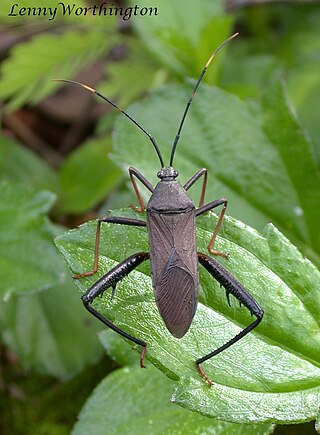
The Cloresmini, sometimes called bamboo coreids, are a tribe of leaf-footed bugs, in the subfamily Coreinae erected by Carl Stål in 1873. Genera are distributed from India, China, Indochina, Malesia through to New Guinea.
